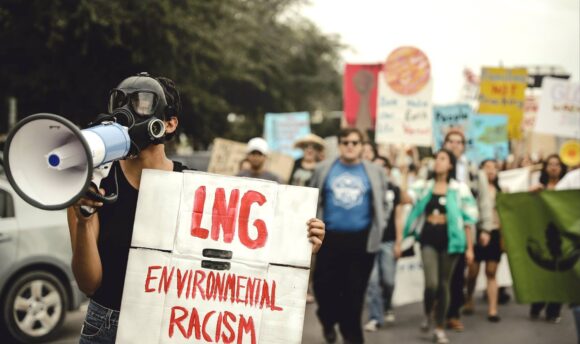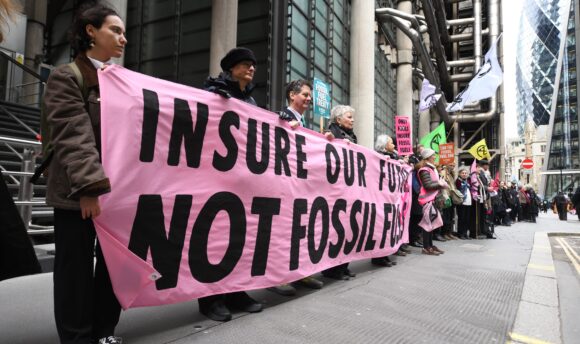A global coalition of 32 environmental, Indigenous, and citizen groups is calling on the companies listed on the insurance certificate for the existing Trans Mountain Pipeline to drop their policies ahead of the August 31 renewal deadline. Citing massive political and environmental risks from one of the most contentious projects in Canada’s history — the expansion of the oil sands pipeline from Alberta to British Columbia — the letter also asks the companies, as well as companies considering insuring the pipeline expansion, to not insure any future oil sands projects.
The Canadian federal government, which purchased the existing pipeline and the expansion from Kinder Morgan after the company struggled to finance the expansion, is in the process of renewing its liability insurance for the existing pipeline, and will be required to provide additional insurance for the pipeline expansion 6 months before it goes into operation. The coalition hopes that by pushing companies to drop their existing insurance policies with Trans Mountain and to stop insuring future oil sands projects, it will show the Canadian government that the expansion is uninsurable and should not continue. If the insurance industry doesn’t provide coverage, Canada will be forced to self-insure the expansion, putting taxpayers on the hook for an additional $1.1B.
“The insurance industry worldwide is rapidly coming to terms with the existential threat climate change poses to its business model. Providing insurance services to a project that would allow exponential growth of the oil sands, effectively removing any remaining chance of Canada staying within the goals of the Paris climate change agreement, would critically undermine the continued viability of your industry,” reads the letter.
Only 12 companies out of 27 responded to the letter. Generali said it is not currently insuring the project and pledged not to be involved in the future. Swiss Re referenced its existing policies on oil sands, environmental protection, and human rights, and Munich Re said it is working on a general policy for the oil sands industry. Swiss Re and Munich Re did not comment specifically on the Trans Mountain Pipeline.
Zurich, the largest insurance company in Switzerland, recently announced a policy to restrict insurance for, and divest from, the oil sands industry. The company, which is listed on the certificate as the primary liability insurer, said it would continue to insure the existing Trans Mountain Pipeline while having discussions with the Canadian government on whether the existing pipeline would allow Canada to meet its climate commitments under the Paris Agreement. Zurich did not comment specifically on the expansion of the Trans Mountain Pipeline.
"If the Trans Mountain Pipeline goes forward, there is no way for Canada to meet its climate commitments under the Paris Agreement. It's clear Zurich needs to commit to not insure the pipeline expansion. We are encouraged by Zurich’s recent policy, and we are calling on other insurance companies to stop insuring the expansion of the fossil fuel industry."
"The time has come for deep transformations to the energy sector, but despite Zurich’s own policy to align with the Paris Agreement, this decision shows that the company is continuing business as usual. By renewing coverage of the Trans Mountain Pipeline, Zurich betrays its own commitments and actively facilitates the destructive impacts of the oil sands industry on Indigenous rights, the local environment, and the climate."
According to the Carnegie Oil-Climate Index, Canadian oil sands are one of the dirtiest, highest-carbon sources of oil on the planet. The letter details the growing political and Indigenous opposition to the Trans Mountain Pipeline in the U.S. and Canada — including from Washington Gov. Jay Inslee, British Columbia Premier John Horgan and more than 150 First Nations and Tribal Chiefs, including Tsleil-Waututh Nation and Squamish Nation — and explains how the pipeline expansion would contribute to the growth of the oil sands industry, the largest and fastest-growing source of carbon emissions in Canada.
"This letter clearly spells out why US insurance giants AIG, Chubb, and Liberty Mutual, along with other global insurers, must rule out insuring the Trans Mountain Pipeline. Any company that elects to cover the risks of this project will now know that doing so represents a grave threat to Indigenous rights, as the project has not obtained the free, prior, and informed consent of First Nations that would be directly impacted by the route."
"The insurance industry cannot address the dangers of climate change if it continues to support fossil fuel infrastructure that jeopardizes our oceans and climate. The existing Trans Mountain Pipeline puts the entire West Coast region at risk of a catastrophic oil spill — threatening communities, Indigenous peoples, and the Southern Resident orca whales. The insurance industry must refuse to support the climate-destroying Trans Mountain Pipeline."
Companies that currently insure the Trans Mountain Pipeline and that received the letter include: AIG, Chubb, and Liberty Mutual (US); HDI Global SE, a subsidiary of Talanx, and Temple Insurance, a subsidiary of Munich Re (Germany); Lloyd’s (UK); RSA Group and Stewart Specialty Risk Underwriting (Canada); and Zurich (Switzerland).
"Talanx and Munich Re showed some responsibility in the past by restricting reinsurance for coal. In response to the letter, both companies indicated their discomfort with insuring the oil sands industry, but both cleverly avoided committing to not insuring the Trans Mountain Pipeline. Although Munich Re announced it is working on an oil sands policy, this does not mean it won’t go for one last deal. We look forward to a strong policy from Munich Re that does not allow for any exceptions such as oil sands pipelines."
The letter was also sent to companies that previously insured the existing pipeline, to urge them not to return to the project: MS Amlin, ANV MGU, and StarStone (UK); Starr and the Markel Corporation (US); QBE (Australia); SCOR (France); Swiss Re (Switzerland); Sompo (Japan); Axis Capital, Argo, OCIL and Lancashire (Bermuda); and Arch (US).
Companies without oil sands policies that would prevent them from insuring the project that received the letter include: Allianz and Hannover Re (Germany); Generali (Italy); and MAPFRE (Spain).
LETTER SIGNATORIES
The 32 environmental, Indigenous, and citizen groups that signed the letter are: 350.org Canada, 350.org Japan, Burnaby Residents Opposing Kinder Morgan, Bold Alliance, Communities for a Better Environment, Consumer Watchdog, Friends of the Earth Canada, Friends of the Earth US, Friends of the San Juans, Fundacja RT-ON, Georgia Strait Alliance, Greenpeace Canada, Greenpeace International, Greenpeace Netherlands, Greenpeace Switzerland, Greenpeace USA, Japan Center for a Sustainable Environment and Society, the Lands Council, Les Amis de la Terre France, Leadnow, Living Oceans Society, Natural Resources Defense Council, Oil Change International, Oregon Physicians for Social Responsibility, Public Citizen, Sierra Club, Stand.earth, Union of BC Indian Chiefs, Urgewald, Waterkeeper Alliance, West Coast Environmental Law, and the Wilderness Committee.



